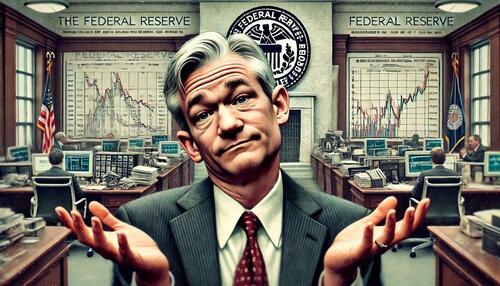In the latest episode of the Money Metals Midweek Memo, host Mike Maharrey delved into the perils of central planning and the inherent limitations of human knowledge, drawing on insights from economist Friedrich Hayek and financial expert Jim Grant.
The episode offered a critical examination of the Federal Reserve's monetary policy and its implications for the economy.
Planning in Uncertainty
Maharrey began with personal anecdotes to illustrate the unpredictability of life. He shared stories of a day disrupted by a flat tire and an unexpected plumbing issue during a home renovation, underscoring the theme that "you don't know what you don't know." This unpredictability, he argued, is a fundamental flaw in central economic planning.
The Knowledge Problem
Maharrey referenced Friedrich Hayek's seminal work, "The Use of Knowledge in Society," to explain why central planning is doomed to fail. Hayek's "knowledge problem" posits that no central planner can possess all the information necessary to make informed economic decisions. Hayek wrote, "The knowledge of the circumstances of which we must make use never exists in concentrated or integrated form but solely as the dispersed bits of incomplete and frequently contradictory knowledge which all the separate individuals possess."
Jim Grant's Critique of Central Planning
Maharrey highlighted an interview with Jim Grant on Fox Business, where Grant criticized the Federal Reserve's approach to monetary policy.
Grant described central planning as "the ignorance that knows not it’s ignorant," a phenomenon where policymakers fail to recognize the limits of their knowledge.
He stressed the importance of markets in discovering interest rates rather than having them imposed by central authorities.
Grant also pointed out the flaws in the Federal Reserve's interest rate projections, noting that they are accurate only 38% of the time, which Maharrey compared to flipping a coin.
This statistic underscores the speculative nature of central banking decisions.
In the interview, Grant made a compelling point: "Assumptions are harmless as long as the assuming party doesn’t confuse them with foreknowledge."
Historical Perspective
To provide context, Maharrey reflected on the contrasting attitudes of policymakers in 1953, the first year of President Dwight D. Eisenhower's administration. At that time, there was a commitment to balancing the budget and restoring the dollar to gold convertibility. Federal Reserve Chairman William McChesney Martin lauded the free market and emphasized that fixed interest rates and economic dysfunction were not part of American institutions.
In contrast, today's Federal Reserve is deeply involved in manipulating markets and interest rates. Maharrey pointed out that despite their confidence, central planners are inevitably blind to the full consequences of their actions, leading to economic dysfunction.
"The future is a phenomenon both strange and wondrous though it doesn’t exist unless we reckon with it," Grant remarked, highlighting the unpredictability of economic outcomes.
The Current Economic Climate
Maharrey criticized the current mindset that the Federal Reserve has everything under control, attributing the stock market's highs to easy money policies rather than effective economic governance. He argued that the apparent stability over the past two decades has given people a false sense of security, ignoring the underlying issues that could lead to future economic crises.
Maharrey expressed significant skepticism about Jerome Powell and the Federal Reserve's ability to manage the economy effectively. He argued that central planners, including Powell, are often overly confident in their ability to predict and control economic outcomes, despite lacking the necessary comprehensive knowledge.
Maharrey emphasized that "they don’t know what they don’t know," highlighting the inherent unpredictability and complexity of economic systems.
He pointed out that the Federal Reserve's interest rate projections are only accurate 38% of the time, suggesting that their decisions are more speculative than scientific. Maharrey was critical of the Fed's past and current policies, including the handling of the 2008 financial crisis and the response to the pandemic, which he believes have led to long-term economic instability.
Maharrey also criticized the mainstream investment world for treating Fed officials like "demigods handing down wisdom from on high," despite their frequent inaccuracies and failures. He argued that the Fed's current monetary policies, including interest rate manipulation, are based on hubris and a false sense of certainty, leading to potential future economic crises.
The Importance of Humility
Maharrey echoed Grant's advice for investors and policymakers to approach their predictions with humility. Grant reminded us that the future is uncertain and that past successes do not guarantee future accuracy. Maharrey emphasized that understanding historical economic trends and fundamentals can help make more informed predictions, but one must always remain cautious and prepared for unexpected events.
"Hubris almost always gets you in trouble," Maharrey warned, reflecting on Grant's insights about exaggerated pride and self-confidence.
Preparing for Uncertainty
In conclusion, Maharrey stressed the importance of having a safe haven like gold and silver in one's investment portfolio to hedge against economic uncertainty. He encouraged listeners to contact Money Metals Exchange to explore opportunities in precious metals, especially during periods of market volatility.
Final Thoughts
Maharrey wrapped up the episode by inviting listeners to stay informed through Money Metals' various platforms and to tune in to their regular podcasts for more insights into the precious metals markets and economic trends. "Just because nothing bad has happened yet doesn’t mean it’s not going to happen," Maharrey cautioned, urging a proactive approach to financial preparedness.
For more detailed insights, listeners are encouraged to visit the Money Metals website and subscribe to the updates and podcasts.




